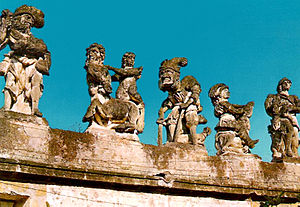Villa Palagonia


The Villa Palagonia is a patrician villa in Bagheria, 15 km from Palermo, in Sicily, southern Italy. The villa itself, built from 1715 by the architect Tommaso Napoli with the help of Agatino Daidone, is one of the earliest examples of Sicilian Baroque. However, its popularity comes mainly from the statues of monsters with human faces that decorate its garden and its wall, and earned it the nickname of "The Villa of Monsters" (Villa dei Mostri).

This series of grotesques, created from 1749 by Francesco Ferdinando II Gravina, Prince of Palagonia, aroused the curiosity of the travellers of the Grand Tour during the 18th and 19th centuries, for instance Henry Swinburne, Patrick Brydone, John Soane, Goethe, the Count de Borde, the artist Jean-Pierre Houël or Alexandre Dumas, prior to fascinate surrealists like André Breton or contemporary authors such as Giovanni Macchia and Dominique Fernandez, or the painter Renato Guttuso.
In 1885, the villa was bought by private individuals, whose heirs are still in possession, and is partially open to the public.

Villa Palagonia has been one of the venues for music concerts held within the framework of the Concert Season of Bagheria (Stagione Concertistica Città di Bagheria) initiative since 2017, with free entrance.[1][2]
Palagonìa and Mineo
[edit]Palagonìa and Mineo are a rocky area rich of caverns escaved and adhibited to be funerary tombs. One of them, the tomb 15 of Mineo (St. Febronia), has an inscription with letters high 8.5/6 cm on the right side and 13/10 cm on the left one. Palegraphic studies of the funerary public inscriptions are the unique available methodology to date Sicilian tombs back to the VII century BC. Similar archeological findings were held in Licodia Eubea, Sciri (with relevant affinities to the etruscan Tarquinia) and Mendolito (Adrano), showing a close connection between the Sicels and the population living in the central Italy like the Etruscans.[3]
Sources
[edit]- Claude Arthaud, Les Palais du rêve, Arthaud, 1970 (in French)
- Michel-Jean, comte de Borch, Lettres sur la Sicile et sur l'île de Malte, 1782 Extraits en ligne
- (in English) Patrick Brydone, A Tour Through Sicily and Malta: In a Series of Letters to William Beckford, Esq. of Somerly in Suffolk (1st ed. 1773)
- (in French) Alexandre Dumas, Impressions de voyage
- (in French) Dominique Fernandez, Le Radeau de la Gorgone (Promenades en Sicile), photographies de Ferrante Ferranti, Grasset, 1988
- (in French) Dominique Fernandez, Le Voyage d'Italie (Dictionnaire amoureux), photographies de Ferrante Ferranti, Plon, 1997
- (in French) Goethe, Voyage en Italie, 1787
- (in French) P. Hachet, Psychanalyse d'un choc esthétique : La villa Palagonia et ses visiteurs, L'Harmattan, 2002
- (in French) Giovanni Macchia, Le Prince de Palagonia, Quai Voltaire, 1987
- (in French) Dacia Maraini, Retour à Bagheria, Seuil, 2004
- (in English) E. H. Neil, Architecture in context : The Villas of Bagheria, Sicily, Harvard University, 1995
- (in French) Madeleine Pinault, Catalogue de l'exposition Houël, Voyage en Sicile, 1776-1779, musée du Louvre, RMN
- (in Italian) Mario Praz, Bellezza e bizzarria, 1960
- (in French) Mario Praz, Le Jardin des sens, Christian Bourgois, 1975
- (in Italian) F. Santapà, Villa Palagonia a Bagheria, Palermo, Palma, 1968
- (in Italian) R. Scaduto, Villa Palagonia: storia e restauro, Bagheria, E. M. Falcone, 2007
- (in Italian) Ferdinando Scianna, La Villa dei mostri, Einaudi, 1977
- (in English) Henry Swinburne, Travels in the Two Sicilies, 1777-1780, Cadell & Elmsly, London, 1790
- (in Italian) N. Tedesco, Villa Palagonia, Palermo, 1988
- (in French) Angheli Zalapì, Demeures de Sicile, préface de Gioacchino Lanza Tomasi, photographies de Melo Minnella, Könemann, 2000
Filmography
[edit]- Several scenes of L'Avventura (1960), by Michelangelo Antonioni, with Monica Vitti, were filmed at the Villa Palagonia.
- Several scenes of " Mafioso (1962), by Alberto Lattuada, with Alberto Sordi
- In The Wedding Director (2006), by Marco Bellocchio, Sami Frey plays the part of a descendant of the Prince Gravina di Palagonia.
- Filming of the scenes from "L'Avventura" are featured in "Baaria" (2009) which is set in Bagheria by director Giuseppe Tornatore
See also
[edit]References
[edit]- ^ "Orchestra a mandolini a plettro". CulturArt Palermo (in Italian).
- ^ "16° appuntamento della seconda Stagione Concertistica Città di Bagheria "Gran Concerto a Villa Palagonia"" [16th meeting of the second Concert Season of Bagheria "Grand Concert at Villa Palagonia"]. Città di Bagheria (in Italian). November 28, 2018. Retrieved November 27, 2019.
- ^ Federica Cordano (2012). "Iscrizioni monumentali dei Siculi" [Monumental inscription of Siciles] (PDF). Aristonothos: Scritti per il Mediterraneo Antico (Atti del Seminario di Studi dell'Università degli Studi di Milano (23‑24 novembre 2009) (in Italian). 4: 165–166. 172. doi:10.6092/2037-4488/1942. ISSN 2037-4488. OCLC 7179633374. Archived from the original on May 13, 2018 – via DOAJ.
{{cite journal}}: External link in|via=
External links
[edit]- (in Italian) Villa Palagonia - official site
- (in English) Villa Palagonia: Photos and info
- LIFE Magazine (May 8, 1950) article
